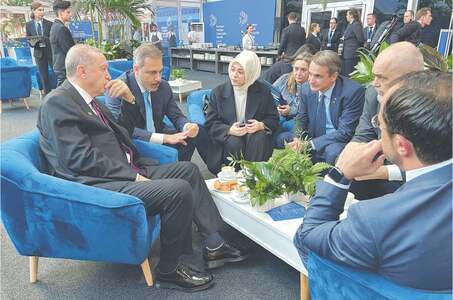VIENNA, Oct 4: Israel accused North Korea on Saturday of providing weapons of mass destruction to six countries in the Middle East that ignored arms-control commitments.
The Jewish state spoke as the 145-nation assembly of the UN nuclear watchdog, the International Atomic Energy Agency, adopted a resolution unanimously urging North Korea to reverse steps it has taken to revive its shutdown atom bomb programme.
Israel itself is the target of two hotly disputed Arab-sponsored draft resolutions in the assembly urging it to give up its nuclear arms monopoly in the Middle East, join the Non-Proliferation Treaty (NPT) and accept full IAEA inspections.
Israel said there were six Middle Eastern countries which had obtained the means produce doomsday weapons and ballistic missiles covertly from North Korea while ignoring commitments as members of the NPT and other arms-control regimes.
“At a time when the international community concentrates on North Korea’s nuclear activities and its non-compliance with safeguards agreements, the Middle East is at the receiving end of North Korea’s reckless practices,” Israeli envoy David Danieli told the global meeting in Vienna.
“North Korea has long become a source of proliferation of dangerous weapons of mass destruction and ballistic missiles in the Middle East,” he said.
SIX COUNTRIES: “At least half a dozen countries in the region who do not even pay lip service to control regimes and are acting in bad faith regarding their stated policy and their undertakings regarding non-proliferation conventions have become eager recipients of North Korea mostly through black market and covert network channels.” Danieli did not name the six nations.
Western intelligence officials and non-proliferation experts have said that Iran, Syria, Libya and Iraq under Saddam Hussein were believed to have received North Korean military aid, some applicable to mass-destruction weaponry, in the past.
“No due attention is paid to this dark aspect of North Korean behaviour which has become a matter of great concern to my government and others,” Danieli said.
He said there was growing evidence that such states were “emulating the dangerous unlawful practices” of North Korea, which left the NPT in 2003 and developed atom bombs.
“(We) call the attention of the international community to these dangerous developments and their consequences,” he said.
Iran is under IAEA investigation over intelligence allegations of secret atomic bomb research. Syria is under IAEA scrutiny over US reports it almost built a plutonium-producing reactor before Israeli warplanes bombed the site a year ago.
Iran and Syria, adversaries of Israel, deny the allegations.
Libya scrapped a covert nuclear arms programme in 2003.
The assembly of the UN nuclear watchdog also passed a resolution on Saturday urging North Korea not to renege on a nuclear disarmament pact.
The motion was adopted by consensus a day after a US envoy ended a trip to Pyongyang meant to salvage the collapsing deal, calling the talks substantive but declining to say if he swayed North Korea to give up plans to restart its nuclear complex.
The resolution underlined the need for a diplomatic solution that achieves denuclearization of the Korean peninsula verifiable by IAEA inspectors.
It also stressed “the importance of an early resumption of (nuclear) disablement and of working to complete disablement and other parallel actions” as agreed by Pyongyang with the United States, Russia, China, South Korea and Japan.
In debate on the resolution, China’s envoy said denuclearization “has met with difficulties” but said the process could be salvaged if “all parties meet each other halfway” and they should redouble efforts to that end.
US Assistant Secretary of State Christopher Hill was in Pyongyang for three days focusing on the crux of the breakdown in the process a deal that would allow inspectors into North Korea to check claims it made about its nuclear programme in exchange for an end to diplomatic and trade sanctions.
“I don’t want to talk about progress. I don’t want to say I am satisfied,” Hill told reporters in Seoul.
US State Department spokesman Robert Wood said North Korea did not seem to halt efforts to restart its Yongbyon nuclear plant during Hill’s visit.
The nuclear agreement North Korea struck with the United States, China, Russia, Japan and South Korea in February 2007 was put in peril after Pyongyang vowed last month to rebuild the aging Yongbyon plant, its source for weapons-grade plutonium, in anger at not being removed from a US terrorism blacklist.
Washington said it would take the North off the terrorism list, bringing economic and diplomatic benefits, once a system had been agreed to verify Pyongyang’s nuclear claims.—Reuters













































Dear visitor, the comments section is undergoing an overhaul and will return soon.